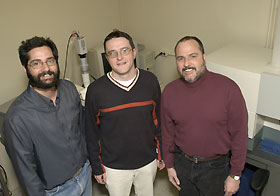|
This is an archived article.
For the latest news, go to the Advance Homepage
For more archives, go to the Advance Archive/Search Page. |
||
|
NIH Funds Biodefense Project
A $5.5 million federal grant titled "Modulation of Biodefense Reponses to Bacterial Pathogens" has been awarded to Health Center researchers for the study of the immune response system, in order to create effective and longer-lasting vaccines. Infectious diseases continue to cause significant worldwide morbidity and mortality due to factors such as poor sanitation, new infectious agents, lack of effective vaccines, and antibiotic resistance, says principal investigator Leo Lefrancois, chief of the division of immunology and professor of medicine at the Health Center.
Lefrancois says vaccine development has become a critical issue, in light of the threat of intentional infectious contamination. "Although our knowledge of basic immune defense systems against infection has grown dramatically in recent years, substantial gaps in our knowledge remain," he says. "This grant will allow us to expand our scientific range into areas with potential for eventual manipulation of immune responses relevant to human biodefense." Lefrancois and Health Center researchers Stephen McSorley, and Anthony Vella, assistant professors in the department of medicine, will be investigating the T-cell immune response to bacterial infections and bacterial antigens. Their long-term goal is to define the parameters required to mount an effective and protective immune response. Awarded by the National Institute of Allergy and Infectious Diseases under the new Biodefense and Emerging Infectious Diseases Initiative, the four-and-a-half year grant is composed of three projects that focus on the immune response to bacteria and its byproducts to counter potential biowarfare infectious agents or their toxins. The researchers will look at staphylococcal enterotoxins, produced by bacteria, and Listeria and Salmonella bacteria. Each investigator will study one of the bacterial agents. All three projects will examine specific cells' interactions following infection or toxin challenge. One of the targets of study is the major antigen-present cell, the dendritic cell, which is known to be essential to initiate immune responses. "The action of bacteria and their products on dendritic cells is known, but understanding the complexity of the downstream effects of this action has now become a major objective in immunologica l and microbiological research," says Lefrancois. "Comprehending the interactions between these cells is essential to our ability to intelligently design safe and effective vaccines. The hypothesis is that early interactions dictate whether or not long-term immunity is induced." According to Lefrancois, the studies will provide a natural bridge towards the goal of augmenting protective immunity. "Our central theory is that early cell interactions determine whether or not long-term immunity results," says Lefrancois. "We anticipate new insights in regulating immune response that can lead to new ways to create even more effective, longer-lasting vaccines than currently exist. We are interested in long-term immunity." |

